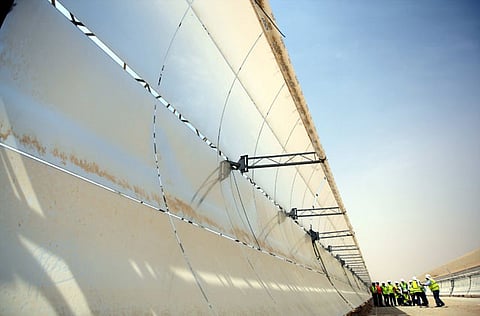World’s largest solar power plant Shams-1 built at cost of $600m near Abu Dhabi
100 megawatt solar power plant to be formally inaugurated on Sunday

Dubai: The inauguration of the world’s largest solar power plant in operation, the $600 million, 100 megawatt Shams-1 located 120 kilometres southwest of Abu Dhabi will enable its parent Masdar gain a competitive edge in developing and investing in similar projects in the region, said a senior official at Shams-1.
“The project will build a track record for Masdar for developing such renewable projects that operate in harsh weather conditions combining dust, high temperature and strong seasonal winds. With other countries in the region interested in pursuing similar renewable projects due to their obvious financial benefits, Masdar will gain a competitive edge over other developers,” Yousuf Al Ali, general manager at Shams Power Company told Gulf News in a telephone interview.
The solar power plant at Madinat Zayed is scheduled to be formally inaugurated on Sunday. As many as 30 per cent of the employees at Shams are UAE nationals, which the company intends to increase to 40 per cent, according to Al Ali.
Al Ali said major equipment for the plant were built by more than 70 local companies, besides foreign companies. The assembly of the solar field was done by a local company - Amana, while the electrical work in the solar field was done by Al Hussam. Besides, major heaters and boosters were built by Fabtech, another local manufacturer.
“The cost of electricity produced from photovoltaic is comparable and could be even lower compared to electricity generated from diesel,” Al Ali said, adding that while the cost of producing electricity from conventional fossil fuel-based energy sources was rising, the cost of electricity generation, globally, from renewable energy sources was coming down and this may slide even further in the foreseeable future with the economies of scale and better knowhow.
The Abu Dhabi-based Masdar appointed the bidding consortium of Total and Abengoa Solar as a partner to own, build and operate Shams -1. Masdar holds a 60 per cent stake in the venture, while Total and Abengoa Solar each hold a 20 per cent stake.
Shams-1 will contribute towards Abu Dhabi’s target of achieving seven per cent renewable energy power generation capacity by 2020. Power demand in Abu Dhabi is growing rapidly and is expected to reach 20 gigawatts by 2020.
According to Masdar, Shams 1 extends over an area of 2.5 square kilometres and will feed power to the UAE national grid. Work on the project started in the third quarter of 2010 with the stated purpose of generating enough energy to power 20,000 homes.
“The UAE is the only Middle East and Opec [Organisation of Petroleum Exporting Countries] country which is exporting both hydrocarbons and renewable energy. This solar project will help conserve the country’s hydrocarbon resources, which can be exported,” said another person familiar with the ongoing developments at Shams-1.
He added: “The UAE leadership is investing in new energy technologies because that’s the future.”
Masdar currently owns 12 per cent of the installed global capacity for concentrated solar power technology (CSP).
Sign up for the Daily Briefing
Get the latest news and updates straight to your inbox



